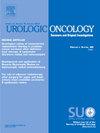QUALITY OF LIFE, DECISIONAL REGRET, AND FEAR OF RECURRENCE IN PATIENTS WITH MUSCLE-INVASIVE BLADDER CANCER MANAGED WITH SURVEILLANCE AFTER CLINICAL COMPLETE RESPONSE TO NEOADJUVANT CHEMOTHERAPY
IF 2.4
3区 医学
Q3 ONCOLOGY
Urologic Oncology-seminars and Original Investigations
Pub Date : 2025-03-01
DOI:10.1016/j.urolonc.2024.12.041
引用次数: 0
Abstract
Introduction
While the standard-of-care for muscle-invasive bladder cancer (MIBC) includes radical cystectomy (RC) and urinary diversion, many patients are unfit or unwilling to undergo major surgery and instead opt for a bladder-sparing approach. Data regarding the safety and durability of surveillance in patients who achieve a clinical complete response (cCR) to neoadjuvant chemotherapy (NAC) is accumulating and encouraging. Despite this increasing interest from both patients and clinicians, there is limited data on the quality of life of cCR patients. In this study, we surveyed patients in our prospectively maintained clinical database who achieved cCR and were managed primarily with surveillance.
Methods
We contacted all patients from our prospectively maintained cCR database for enrollment in our study. Consenting participants were emailed via Docusign three validated quality of life surveys, including the Bladder Cancer Index (BCI), the Fear of Cancer Recurrence Inventory-Short Form (FCRI-SF), and the Decision Regret Scale. These surveys evaluate urinary function, bowel habits, sexual function, fear of cancer recurrence, and decisional regret. Survey responses were recorded in REDCap under a de-identified profile. Survey data was analyzed using descriptive statistics.
Results
From a total of 61 patients in the cCR database, 33 patients were alive and available to participate. To date, 19 (58%) patients have completed the surveys. Patient demographics and disease characteristics are presented in Table 1. Of the 19 participants, 79% (15/19) had a native bladder, 5% (1/19) had a neobladder, 5% (1/19) had a continent catheterizable pouch, and 11% (2/19) had an ileal conduit. Of the cCR patients with durable response, 100% (15/15) had no decisional regret and 67% (10/15) had little to no fear of cancer recurrence. Conversely, in cCR patients with recurrence and subsequent RC, 25% (1/4) had significant decisional regret and 75% (3/4) had some fear of cancer recurrence. Of the durable response cCR patients, 93% (14/15) had no urinary bother while 50% (2/4) of the recurrence and subsequent RC patients had some urinary bother.
Conclusions
As surveillance in patients with MIBC who achieve cCR after NAC becomes increasingly utilized, data on the implications of lifelong surveillance, frequent non-invasive recurrences, and the fear of cancer recurrence will be important to consider. In the data available at this time from our institutional cCR cohort, all patients with a durable response were free of decisional regret, nearly all (93%) had no urinary bother despite frequent interventions, and two thirds lacked fear of cancer recurrence. Study limitations include small sample size, response and selection bias given the survey format, and limited generalizability given patients were recruited from a single institution. Nevertheless, these results suggest that patients managed with bladder-sparing after achieving cCR have acceptable quality of life. An expanded cohort is being compiled and comparisons with an upfront radical cystectomy cohort are ongoing.
新辅助化疗临床完全缓解后监测的肌肉浸润性膀胱癌患者的生活质量、决策后悔和复发恐惧
虽然肌肉浸润性膀胱癌(MIBC)的标准治疗包括根治性膀胱切除术(RC)和尿路转移,但许多患者不适合或不愿意接受大手术,而是选择保留膀胱的方法。关于对新辅助化疗(NAC)达到临床完全缓解(cCR)的患者进行监测的安全性和持久性的数据越来越多,令人鼓舞。尽管患者和临床医生对此越来越感兴趣,但关于cCR患者生活质量的数据有限。在这项研究中,我们调查了我们前瞻性维护的临床数据库中达到cCR的患者,并主要通过监测进行管理。方法:我们从前瞻性维护的cCR数据库中联系所有患者纳入我们的研究。同意的参与者通过Docusign三个经过验证的生活质量调查通过电子邮件发送,包括膀胱癌指数(BCI),癌症复发恐惧清单-短表(FCRI-SF)和决策后悔量表。这些调查评估了泌尿功能、排便习惯、性功能、对癌症复发的恐惧和决定后悔。调查结果在REDCap中以匿名的形式记录下来。调查数据采用描述性统计进行分析。结果在cCR数据库中的61例患者中,有33例患者存活并可参与。迄今为止,19名(58%)患者完成了调查。患者人口统计和疾病特征见表1。在19名参与者中,79%(15/19)有天然膀胱,5%(1/19)有新膀胱,5%(1/19)有大陆导尿管袋,11%(2/19)有回肠导管。在持久缓解的cCR患者中,100%(15/15)没有决定性后悔,67%(10/15)很少或没有对癌症复发的恐惧。相反,在复发的cCR患者中,25%(1/4)的患者有明显的决定后悔,75%(3/4)的患者对癌症复发有一定的恐惧。在持久缓解的cCR患者中,93%(14/15)没有尿尿困难,而50%(2/4)的复发和后续的RC患者有尿尿困难。结论在NAC后实现cCR的MIBC患者中,sa监测的应用越来越广泛,终身监测、频繁的非侵袭性复发以及对癌症复发的恐惧等数据的影响将是重要的考虑因素。目前从我们的机构cCR队列中获得的数据显示,所有有持久反应的患者都没有决定后悔,尽管经常干预,但几乎所有(93%)患者都没有尿尿问题,三分之二的患者对癌症复发没有恐惧。研究的局限性包括样本量小,调查形式造成的反应和选择偏差,以及由于患者是从单一机构招募的,因此泛化性有限。然而,这些结果表明,在达到cCR后膀胱保留的患者有可接受的生活质量。正在编制一个扩大的队列,并与前期根治性膀胱切除术队列进行比较。
本文章由计算机程序翻译,如有差异,请以英文原文为准。
求助全文
约1分钟内获得全文
求助全文
来源期刊
CiteScore
4.80
自引率
3.70%
发文量
297
审稿时长
7.6 weeks
期刊介绍:
Urologic Oncology: Seminars and Original Investigations is the official journal of the Society of Urologic Oncology. The journal publishes practical, timely, and relevant clinical and basic science research articles which address any aspect of urologic oncology. Each issue comprises original research, news and topics, survey articles providing short commentaries on other important articles in the urologic oncology literature, and reviews including an in-depth Seminar examining a specific clinical dilemma. The journal periodically publishes supplement issues devoted to areas of current interest to the urologic oncology community. Articles published are of interest to researchers and the clinicians involved in the practice of urologic oncology including urologists, oncologists, and radiologists.

 求助内容:
求助内容: 应助结果提醒方式:
应助结果提醒方式:


